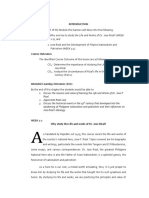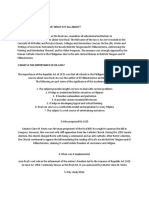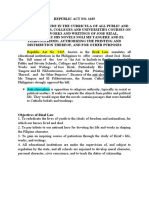Rizal Law
Rizal Law
Uploaded by
Mathilda Victoria GomezCopyright:
Available Formats
Rizal Law
Rizal Law
Uploaded by
Mathilda Victoria GomezOriginal Title
Copyright
Available Formats
Share this document
Did you find this document useful?
Is this content inappropriate?
Copyright:
Available Formats
Rizal Law
Rizal Law
Uploaded by
Mathilda Victoria GomezCopyright:
Available Formats
REPUBLIC ACT NO.
1425
REPUBLIC ACT NO. 1425 - AN ACT TO INCLUDE IN THE CURRICULA OF ALL PUBLIC AND PRIVATE SCHOOLS, COLLEGES AND UNIVERSITIES COURSES ON THE LIFE, WORKS AND WRITINGS OF JOSE RIZAL, PARTICULARLY HIS NOVELS NOLI ME TANGERE AND EL FILIBUSTERISMO, AUTHORIZING THE PRINTING AND DISTRIBUTION THEREOF, AND FOR OTHER PURPOSES
WHEREAS, today, more than any other period of our history, there is a need for a re-dedication to the ideals of freedom and nationalism for which our heroes lived and died; WHEREAS, it is meet that in honoring them, particularly the national hero and patriot, Jose Rizal, we remember with special fondness and devotion their lives and works that have shaped the national character; WHEREAS, the life, works and writing of Jose Rizal, particularly his novels Noli Me Tangere and El Filibusterismo, are a constant and inspiring source of patriotism with which the minds of the youth, especially during their formative and decisive years in school, should be suffused; WHEREAS, all educational institutions are under the supervision of, and subject to regulation by the State, and all schools are enjoined to develop moral character, personal discipline, civic conscience and to teach the duties of citizenship; Now, therefore, Section 1. Courses on the life, works and writings of Jose Rizal, particularly his novel Noli Me Tangere and El Filibusterismo, shall be included in the curricula of all schools, colleges and universities, public or private: Provided, That in the collegiate courses, the original or unexpurgated editions of the Noli Me Tangere and El Filibusterismo of their English translation shall be used as basic texts. The Board of National Education is hereby authorized and directed to adopt forthwith measures to implement and carry out the provisions of this Section, including the writing and printing of appropriate primers, readers and textbooks. The Board shall, within sixty (60) days from the effectivity of this Act, promulgate rules and regulations, including those of disciplinary nature, to carry out and enforce the provisions of this Act. The Board shall promulgate rules and regulations providing for the exemption of students for reasons of religious belief stated in a sworn written statement, from the requirement of the provision contained in the second part of the first paragraph of this section; but not from taking the course provided for in the first part of said paragraph. Said rules and regulations shall take effect thirty (30) days after their publication in the Official Gazette. Section 2. It shall be obligatory on all schools, colleges and universities to keep in their libraries an adequate number of copies of the original and unexpurgated editions of the Noli Me Tangere and El Filibusterismo, as well as of Rizal's other works and biography. The said unexpurgated editions of the Noli Me Tangere and El Filibusterismo or their translations in English as well as other writings of Rizal shall be included in the list of approved books for required reading in all public or private schools, colleges and universities. The Board of National Education shall determine the adequacy of the number of books, depending upon the enrollment of the school, college or university. Section 3. The Board of National Education shall cause the translation of the Noli Me Tangere and El Filibusterismo, as well as other writings of Jose Rizal into English, Tagalog and the principal Philippine dialects; cause them to be printed in cheap, popular editions; and cause them to be distributed, free of charge, to persons desiring to read them, through the Purok organizations and Barrio Councils throughout the country. Section 4. Nothing in this Act shall be construed as amendment or repealing section nine hundred twenty-seven of the Administrative Code, prohibiting the discussion of religious doctrines by public school teachers and other person engaged in any public school. Section 5. The sum of three hundred thousand pesos is hereby authorized to be appropriated out of any fund not otherwise appropriated in the National Treasury to carry out the purposes of this Act. Section 6. This Act shall take effect upon its approval.
Rizals Life, Works and Writings (Social Science 2)
Description: A critical analysis of the life, works and writing of J. Rizal within the context of the Filipino struggle for nationhood and development. The course also presents a rational perspective of Rizal and his worth as an exponent and practitioner of libertarian ideologies particularly in relation to education, religion and culture, women, government and politics, economy and society. In the end Rizals relevance to the existing development realities is established. COURSE OBJECTIVES: General: To present and critically examine Rizals ideas beliefs and philosophies through his works and writing in relation to the existing development problems, issues, and needs thereby generates a sense of direction and involvement in the continuing task of nation building. Specific: 1. To inseminate progressive thinking in line with the present development needs; 2. To instigate a sense of humanism, patriotism, nationalism and morality and Spirituality by way of analyzing Rizals beliefs and philosophy relative to God and religion, government and politics, women and society and culture by-and large; 3. To generate a sense of urgency in the continuing struggle for nationhood and Independence; 4 To challenge the youth in liberating the third and assume the burden of meaningful development. COURSE OUTLINE I. INTRODUCTION A. REPUBLIC ACT 1425 B. N. H. I. Criteria on Selection of Heroes Assigned Activities/Readings 1. Film viewing Little Bad Boy by Howie Severino, I-Witness 2. A critic paper on the two articles; 2.1 Veneration without Understanding by Renato Constantino 2.2 Who made Rizal Our Foremost National Hero by Esteban De Ocampo II. HISTORICAL BACKGROUND A. Europe in the 19th century 1. French Revolution 2. Industrial Revolution B. Philippines in the 19th century C. Factors that brought about the awakening of Filipino nationalism. Assigned Activities/Readings 1. Matrix showing major changes in Europe during the period of French and Industrial Revolution 2. Read Scumacher, Jonh N SJ. Rizal in the Context of the 19th Century
Philippines, The Making of the Nation. 1991 Ocampo Nilo. Lagpas kina Fray Botod. 1993 III. BIOGRAPHY Assigned Activity 1. Film Viewing: Rizal: Ang Buhay ng Isang Bayani ADMU
1861-1881 1882-1892 1892-1896
2. Educational Tour to Luneta, Intramuros, (Knights of Rizal, Masonic Temple) and Calamba Laguna. Output: CD Containing video or photos on the sad tour with insights. IV. THE MANY FACES OF RIZAL 1. 2. 3. 4. 5. 6. 7. 8. 9. 10. MIDTERM EXAM V. SELECTED WRITING 1. POEMS Rizal Rizal Rizal Rizal Rizal Rizal Rizal Rizal Rizal Rizal as as as as as as as as as as a Student an Artist a Lover a Traveler a Doctor a Teacher an Engineer a Scientist/Inventor a Linguist a Farmer
Sa Aking Mga Kabata Through Education the Mother Land Receives Light To the Filipino Youth Last Farewell
2. ESSAYS/LETTER
Letter To the Women of Malolos The Indolent of the Filipino People Philippines A Century Hence Love of Country
3. NOVELS
Noli Me Tangere El Filibusterismo Makamisa
IV. ISSUES/ CONCERNED: Film Viewing BAYANING THIRD WORLD 1. Retraction 2. Relevance of Rizal
Government Rizalista
FINAL EXAM Textbook: Rizal The Icon, by Soc. Sci. Faculty, Univ. of Makati REFFERENCES Guerrero, Leon Ma. The First Filipino. Ocampo, Nilo. Rizal: Makabayan at Martir. Zaide, Gregorio. The Life, Works and Writings of Jose Rizal. Ocampo, Ambeth. Rizal Without the Overcoat. Agoncillo, Teodoro. History of the Filipinos. Schumacher, John SJ. The Making of a Nation Quibuyen, Floro. A Nation Aborted.
You might also like
- Republic Act No. 1425Document5 pagesRepublic Act No. 1425Prix John EstaresNo ratings yet
- Module 1: Republic Act 1425 "Rizal Law": ObjectivesDocument6 pagesModule 1: Republic Act 1425 "Rizal Law": ObjectivesJanelle PedreroNo ratings yet
- Jose Rizal's Collaborations with Other HeroesFrom EverandJose Rizal's Collaborations with Other HeroesRating: 4 out of 5 stars4/5 (6)
- Republic Act No. 1425: June 12, 1956Document2 pagesRepublic Act No. 1425: June 12, 1956Timothy Roger ReyesNo ratings yet
- Rizal LESSON 1Document13 pagesRizal LESSON 1encarnacionhannah06No ratings yet
- Hist 10 Module 1Document8 pagesHist 10 Module 1Jehan PugosaNo ratings yet
- Module 1 Legal Basis of Rizal CourseDocument25 pagesModule 1 Legal Basis of Rizal CourseRodalene Jane NgoNo ratings yet
- Lesson The Trials of The Rizal BillDocument26 pagesLesson The Trials of The Rizal Billgamingemail8080No ratings yet
- Chapter 1 2 RizalDocument5 pagesChapter 1 2 RizalCherry BenitezNo ratings yet
- Chapter 1 - Republic Act 1425 - 202203071048Document8 pagesChapter 1 - Republic Act 1425 - 202203071048Wild RiftNo ratings yet
- What Is Republic Act 1425? What Is It All About?Document4 pagesWhat Is Republic Act 1425? What Is It All About?Kyle Marie Sombrio PeñarandaNo ratings yet
- Chapter 1 - RizalDocument13 pagesChapter 1 - RizalheyzzupNo ratings yet
- Lesson 1 Introduction To Republic Act 1425Document4 pagesLesson 1 Introduction To Republic Act 1425Rafols AnnabelleNo ratings yet
- Life and Works of Rizal Unit 1 3Document23 pagesLife and Works of Rizal Unit 1 3rynchrlsglz12No ratings yet
- RIZALDocument64 pagesRIZALREDDEN GAMBOANo ratings yet
- Republic Act 1425: Rizal LawDocument16 pagesRepublic Act 1425: Rizal LawBernard CastilloNo ratings yet
- Rizal: A Made To Order HeroDocument23 pagesRizal: A Made To Order HeroRegina Milagros Palmiano PetalloNo ratings yet
- Rizal Reviewer (Midterms)Document16 pagesRizal Reviewer (Midterms)jed.berdosNo ratings yet
- Republic Act 1425: Learning Outcomes: at The End of The Chapter, The Students Are Expected ToDocument9 pagesRepublic Act 1425: Learning Outcomes: at The End of The Chapter, The Students Are Expected ToJerico CelesteNo ratings yet
- Module in Life and Works of Rizal 1Document158 pagesModule in Life and Works of Rizal 1Akire BantilanNo ratings yet
- The Life and Works of RizalDocument29 pagesThe Life and Works of RizalGretel T RicaldeNo ratings yet
- Introduction To Rizal Life and Works (20230911175843)Document33 pagesIntroduction To Rizal Life and Works (20230911175843)shopperiz2022No ratings yet
- Intro & Chapter 1Document7 pagesIntro & Chapter 1Jaydee SirugNo ratings yet
- Rizal LessonsDocument9 pagesRizal Lessonstayrayrmp68No ratings yet
- Rizal LawDocument3 pagesRizal LawEileenNo ratings yet
- Life and Works of Rizal SummaryDocument73 pagesLife and Works of Rizal SummaryAlmine100% (2)
- Life and Works of Rizal SummaryDocument79 pagesLife and Works of Rizal SummaryAreel Galvan100% (1)
- Lec 1 Life and Works of RizalDocument10 pagesLec 1 Life and Works of RizalAmethyst ChiongNo ratings yet
- Army Joel Mariano BSEE-3A Rizal - Topic-1Document8 pagesArmy Joel Mariano BSEE-3A Rizal - Topic-1Army Joel Mariano100% (1)
- Rizal All Modules 1 1Document107 pagesRizal All Modules 1 1KELLY JOHN NOCANo ratings yet
- Rizal Chap 13Document37 pagesRizal Chap 13John Rodney Junsan Jr.No ratings yet
- Copy-RIZL111UNIT1 REPUBLICACT142528RIZALLAW29Document96 pagesCopy-RIZL111UNIT1 REPUBLICACT142528RIZALLAW29abi dimatulacNo ratings yet
- Ra 1425 Rizal LawDocument20 pagesRa 1425 Rizal Lawfdmhankins1109No ratings yet
- Life and Works of Rizal Week 1Document7 pagesLife and Works of Rizal Week 1ten tenNo ratings yet
- Ra 1425Document9 pagesRa 1425laurieponsekalNo ratings yet
- Module 1 ReviewerDocument2 pagesModule 1 ReviewerengineersparkconstructioncleanNo ratings yet
- Rizal 1013 Compiled Modules Prelims FinalsDocument94 pagesRizal 1013 Compiled Modules Prelims FinalsMargin Pason RanjoNo ratings yet
- Introduction To Rizals Life and WorksDocument4 pagesIntroduction To Rizals Life and WorksJerson GaberzaNo ratings yet
- GESocSci3_LESSON 1-2Document4 pagesGESocSci3_LESSON 1-2lylascarletevangelineNo ratings yet
- RizalDocument31 pagesRizalBrixter GervacioNo ratings yet
- Rizal ReportDocument26 pagesRizal ReportRonnel CompayanNo ratings yet
- 1 Rizal PR FNDocument130 pages1 Rizal PR FNAsh TabaogNo ratings yet
- Learning Materials - Lesson 1 6Document63 pagesLearning Materials - Lesson 1 6Fridrick CarnilloNo ratings yet
- Gem 101-Lesson 1Document11 pagesGem 101-Lesson 1Jocyn Marie RubiteNo ratings yet
- Rizal PMFDocument121 pagesRizal PMFJonalyn SalvateraNo ratings yet
- Life and Works of Jose Rizal 1Document90 pagesLife and Works of Jose Rizal 1Paulina HurtadoNo ratings yet
- Life and Works of Jose Rizal 1Document112 pagesLife and Works of Jose Rizal 1dennissabalberinojrNo ratings yet
- Name: Christopher A. Estrera Bsis 1 Subject: Rizal Set:Week 1 - 3 Contact No. 09270130272Document3 pagesName: Christopher A. Estrera Bsis 1 Subject: Rizal Set:Week 1 - 3 Contact No. 09270130272Christopher EstreraNo ratings yet
- Republic Act No. 1425: John Edward E. Escote BSN 2-1Document2 pagesRepublic Act No. 1425: John Edward E. Escote BSN 2-1John Edward EscoteNo ratings yet
- Rizal NotesDocument3 pagesRizal NotesJeahn Mica DugadugaNo ratings yet
- Rizal Law-1Document4 pagesRizal Law-1Almer LiantoNo ratings yet
- Chapters (1 4) RizalDocument45 pagesChapters (1 4) RizalApril Joy CajayonNo ratings yet
- Ra 1425 Rizal LawDocument7 pagesRa 1425 Rizal LawJulie-Mar Valleramos LabacladoNo ratings yet
- PI 100 (RIZAL) Republic Act No. 1425-"Rizal Law"Document3 pagesPI 100 (RIZAL) Republic Act No. 1425-"Rizal Law"Santos, Kaira Joy C.No ratings yet
- RizalDocument6 pagesRizalchaeryganteNo ratings yet
- Module 1 RIZALDocument7 pagesModule 1 RIZALreinalyn santiagoNo ratings yet
- Rizal LawDocument2 pagesRizal LawNeil Kenneth AlingodNo ratings yet
- Life and Works of Rizal: Introductory LectureDocument6 pagesLife and Works of Rizal: Introductory LectureRyan AlisacaNo ratings yet
- The Interesting Tales of the Jose Rizal FamilyFrom EverandThe Interesting Tales of the Jose Rizal FamilyRating: 4 out of 5 stars4/5 (10)



























































